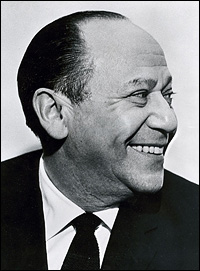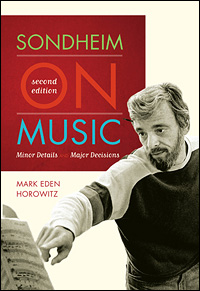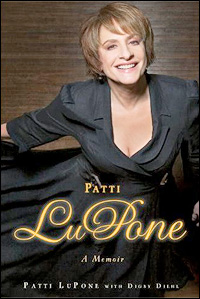
*
"Finishing the Hat" by Stephen Sondheim [Knopf]
The publisher Alfred A. Knopf has given us six handsome coffee-table books containing the complete lyrics of Broadway's greatest, starting with Porter in 1983 and proceeding through Hart, Gershwin, Berlin, Loesser and Hammerstein. And now comes Sondheim, who certainly belongs on the shelf — or the coffee table or piano top — with the others. But "Finishing the Hat" turns out not to be one of those luxurious books of complete lyrics, suitable for browsing and dipping and returning to for casual reference. This new book, compiled not by some careful and conscientious editor but by Mr. Sondheim himself, is a book about lyrics and lyricists. Sondheim incorporates the lyrics from his musicals — the earlier shows, as this is the first of two volumes — but these expert songwords are only the half of it.
The full title is "Finishing the Hat: Collected Lyrics (1954-1981) with Attendant Comments, Principles, Heresies, Grudges, Whines and Anecdotes." The Principles are invaluable, the Comments instructive, the Anecdotes delicious, the Grudges and Whines enlightening, and the Heresies heretically provocative. There is so much here that leaves the reader with jaw agape — or shaking his or her head in wonder, or just plain laughing — that Sondheim's actual lyrics are beside the point. Especially since we already have many of said lyrics printed in liner note booklets on our CD shelf.
Sondheim knows his way around musical theatre lyrics, of course. He has been making statements about his craft — in speeches, interviews, and elsewhere — for years, statements which have whetted the appetite for elucidation. It almost seems like he was saving them up for a time and place and platform from which he could calmly and expertly explain himself in detail. There is no statement or observation made here, no criticism, that is not conscientiously supported. You might not agree with every idea and opinion that Mr. Sondheim chooses to make — I don't suppose he'd want anyone to agree with every idea and opinion — but he makes sure that you understand his reasoning.
Much of the book consists of Sondheim on Sondheim, centering on the lyrics for his completed musicals from Saturday Night (written in 1954, although unproduced in New York until 2000) through Merrily We Roll Along (1981). These are not the complete lyrics as in Knopf's coffee table series, as edited by Robert Kimball with various collaborators. Those books give us just about every scrap of lyric that can be found; if Larry Hart scrawled out an additional couplet on a piece of paper towel, it is included. Sondheim gives us the official version of the lyric as used at the time of the Broadway opening, with occasional alternates (the song as originally written, perhaps, or as changed for revivals or film versions). But none of this every-rhyme-that-we-can-find business. And unlike the other Knopf books, Sondheim does not give us anything he wrote for shows that weren't completed, or material he contributed to shows written by other people, or songs not written for stage use. (It is possible that he intends to include these items in a grab bag at the back of the second volume.) Each lyric is placed in the context of the show in question; many have explanatory notes, which are always illuminating. What's more, Sondheim centers in on any flaws he perceives in his own lyrics — and where have you ever seen anything of the sort? Bad rhymes, faulty scanning, ill-chosen words, rhymes for the sake of rhyming or overly poetic imagery. Lyrics which for the most part you and I have happily listened to for years, mind you; but if Sondheim is embarrassed by something he wrote, he inserts an asterisk and patiently explains why. I have long been an admirer of Sondheim's work in general and Gypsy — among others — in particular. I've always considered "Mr. Goldstone" to be a weak link, though; one joke followed by two-and-a-half minutes that don't help the show or inform the audience or do anything much except provide a few laughs that are never as funny as the opening line of the song. And here comes Mr. Sondheim, precisely explaining why the song — which he describes as "one joke stuffed with wordplay to distract the listener" — is empty. "If the song" — he is referring here to list songs in general, and "Mr. Goldstone" in particular — "has little to say and the songwriter doesn't keep filling the list with witty or surprising examples, the result is an increasingly monotonous waste of time." I wouldn't, myself, characterize "Mr. Goldstone" as a monotonous waste of time; but I agree with the lyricist when he says that the song "sweats with effort."
These spotlighted flaws are minimal, especially when you consider the overall brilliance of Sondheim's work. I cite "Goldstone" here — Sondheim calls it "Have an Egg Roll, Mr. Goldstone," so I suppose that is the official title — merely to illustrate the author's level of earnestness. Elsewhere in the book he explains what makes a good/strong/admirable lyric, and criticizes other lyricists for their shortcomings; Sondheim being Sondheim, he finds it only proper to draw a red circle around every misplaced syllabic stress of his own.
 |
||
| Stephen Sondheim |
As for heresies, Sondheim has set out to present an open and honest view of ten members of what he calls "the Pantheon of Great Lyricists in the English-speaking musical theater." And it does indeed make for provocative reading. Sondheim doesn't play favorites; well he does play favorites, namely Frank Loesser, but what's surprising are the non-favorites. Oscar Hammerstein is praised as mentor, teacher and man; but not as lyricist. Sondheim discusses Hammerstein's penchant for poetic lyrics using a limited and repetitive bag of images. Why does Nellie Forbush, that self-described "little hick" from Arkansas, describe herself as "bromidic"? Why is her sun a "bright canary yellow," a coloring which Sondheim tells us occurs only in the eye of a hurricane? Pretty word syndrome, says he. He gives us a whole paragraph — and an amusing one — about all those birds, and the flying and floating imagery, that Hammerstein returns to again and again; at least one song in every R&H score, he says, and sometimes as many as four. "How can you tell a lark that is learning to pray from one that is actually praying?" he asks. And this is just one of many larks that populate Hammerstein's surrey rides through "medders" and walks through storms.
Hammerstein heads the lower portion of Sondheim's list. Alan Jay Lerner fares worse — "No there there" — while firmly rooted on the bottom are Hart and Gershwin; Sondheim goes on at length about the weaknesses of both, with plenty of examples as fodder. (I wonder if there might be a missing consideration, though.) Two Englishmen — Noel Coward and W.S. Gilbert — fare even worse, being thoroughly raked over the proverbial coals. They seem somewhat out of place in this discussion, to me anyway, but it's Sondheim's party and he's entitled to invite the guests.
 |
||
| Frank Loesser |
Omitted from these pages are the living members of the aforesaid Pantheon, a group in which he includes the recently departed Adolph, Betty and Fred ("because they are not dead to me"). His reasons are obvious; it could be seen as cruel to criticize the work of friends who are around to read what he has to say. But this is a discussion that is of major interest to those of us reading "Finishing the Hat." How can we judge Sondheim's considered assessment of the strengths and weaknesses of Porter without hearing what he has to say about Ebb? Loesser without Harnick? Berlin without Herman? Sondheim has given us the finest and most important discussion of theatrical songwriting we can ever hope to come across; but the examination is left incomplete — in an educational context — by placing Betty & Adolph and Lee Adams and the others off limits. I feel like I've just attended the most instructive college course ever; I'll never forget it, and savor the notes I took and reread them repeatedly. But somehow I seem to have missed three of the most important lectures. Ah, well; this is Sondheim's prerogative, and I'm thrilled that he went as far as he did. The essays on the ten lyricists, really, teach us more about the art of songwriting than anything I've ever read. Reading through the lines, I come away with the impression that Sondheim values one of his peers high above the others; I won't mention the name, though, lest this be a misinterpretation on my part.
Enough said. "Finishing the Hat: Collected Lyrics with Attendant Comments, Principles, Heresies, Grudges, Whines and Anecdotes" is the best thing of its kind, and an indispensable book about musical theatre which in every way lives up to the level of excellence indicated by the presence of the name Sondheim on the title page.
ALSO OF INTEREST
 |
Speaking of Stephen Sondheim, one of the finest books focusing on his work is Mark Eden Horowitz's 2003 study "Sondheim on Music: Minor Details and Major Decisions." Horowitz is an invaluable music specialist at the Library of Congress, whose personal bailiwick is the manuscripts of Rodgers, Porter, Berlin, Bernstein and the like. (Which is some bailiwick!) While processing the incoming Sondheim Collection, he came up with the idea of conducting a series of intensive interviews with the composer "with the intention of anticipating the questions of future scholars." Sondheim readily agreed, with sessions on what were then his six most recent musicals (from Pacific Overtures through Passion). The general interest in these interviews was understandably enormous, so they were duly published. So invaluable was the resulting book that Horowitz and Sondheim got back together for two additional interviews, in which the composer discusses his earlier and later work. These have now been incorporated into a second edition of "Sondheim on Music: Minor Details and Major Decisions," which due to the additional material happily supplants the first volume. And for those of you who believe that the pop world — as embodied by network television — and the groves of Sondheimanian academia cannot and will not ever mix, let us point out that Horowitz's book was used on camera to launch a joke in the Madonna episode of "Glee." So there.
 |
Let's see if I've got this right. Young actress from Long Island is trained by top professionals, and joins a prestigious professional touring company at 23. Makes Broadway debut, gets Tony nomination at 26. Gets cast the following year in co-starring role in major new musical, but it's a disaster which closes out of town and she has a terrible time due to an awful star, an awful star replacement, a bad director, and an especially lousy song about bread. Gets cast in starring role in major new musical, winning overnight fame and a Tony award but has a terrible time due to the role's difficult vocal range, an evil standby, and mean stage managers. Gets invited to the RSC to create role in another major new musical, winning an Olivier but having a terrible time because she has to appear in two crowd scenes and because she belatedly discovers that Jean Valjean is getting more money. Gets cast in the leading role in Broadway's most smashing and enjoyable revival in years, but has a terrible time because the chorus kids are mean to her. Gets cast in a successful, ground-breaking television series but has a terrible time because she hates her leading man. And then comes Sunset Boulevard, where she really has something to complain about. This is Life with Patti. Ms. LuPone has put it all down on paper and it makes for an interesting story of Broadway life at the top in the last quarter of the 20th century. LuPone doesn't carry grudges; she shrink wraps them and hangs them on the wall, with special lighting. Is there another side to these arguments? No reason we should hear it in an autobiography, but the lady doth protest so much — and is so continually victimized — that we wonder if maybe she perennially wakes up on the wrong side of the bed. Maybe her bed doesn't have a right side? Even so, "Patti LuPone: A Memoir" makes for entertaining and breezy reading. And she does offer an intriguing and accurate view of life upon, and off, the wicked stage.
(Steven Suskin is author of the recently released updated and expanded Fourth Edition of "Show Tunes" as well as "The Sound of Broadway Music: A Book of Orchestrators and Orchestrations," "Second Act Trouble" and the "Opening Night on Broadway" books. He writes Playbill.com's popular DVD Shelf and On the Record columns. He can be reached at [email protected].)
*
Passionate about theatre books? See what the Playbill Store has on its shelves.










